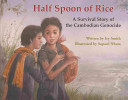 Half Spoon of Rice, A Survival Story of the Cambodian Genocide
Half Spoon of Rice, A Survival Story of the Cambodian Genocide
Written by Icy Smith
Illustrated by Sopaul Nhem
East West Discovery Press, 2010, N. P.
ISBN: 978-0982167588
I feel like I can’t go any further. But when we approach what looks like a dead body, I find new strength to keep moving.
Forced journeys are often found in history when political groups seeking control work to create a powerless, often classless, society. Such is the case in Nat’s story that narrates the Cambodian genocide in the 1970’s. One-fourth of the country’s population died of torture, execution or starvation as the Khmer Rouge army drove people from their homes to work in rice fields. Separated from his family when they reach the fields, Nat meets a young girl, Malis, as they are foraging in the woods for survival. Walking over dead bodies to avoid land mines and eating the legs off frogs, the two young prisoners reflect the violence and harshness of this episode of Cambodian history. Not only is their forced journey to the labor fields a brutal experience, but when the Vietnamese Liberation Army frees them, another treacherous journey ensues as Nat and Malis try to find their families after years of hard work. Both the child’s first hand, realistic perspective and the impressionistic oil paintings provide a haunting story that is important for readers of all ages but will require a context for younger readers. Sources list the picture book as for grades 4 – 8.
Based on true stories told by children who survived the genocidal Khmer Rouge regime, the historical accuracy of Half Spoon of Rice, according to its publishers, is endorsed by the Documentation Center of Cambodia. A lengthy author’s note reveals more about this horrific event. Icy Smith is the author of other books recognized by significant awards that speak to their authenticity. The Lonely Queue: The Forgotten History of the Courageous Chinese Americans in Los Angeles (2001) received the Clarion Award for best nonfiction and Mei Ling in China City (2008) received the Chinese American Library Association Best Children’s Book Award among others. Attesting as well to the authenticity of the visual portrayal of Cambodian history in this book, Sopaul Nhem’s work has earned international awards from the University of Cambodia and the Ministry of Culture and Fine Arts. He studied modern art at the Royal University of Fine Arts at Phnom Penh, Cambodia. His father was a survivor of the “killing fields” era according to a review by Jack Ong, Executive Director of the Dr. Haing S. Ngor Foundation (review provided by publisher).
Half Spoon of Rice can be shared as another insight to the Holocausts that have occurred internationally, such as in The Cat with the Yellow Star: Coming of Age in Terezin (Susan Goldman Rubin and Ela Weissberger, 2006) and Memories of Survival (Esther Nisenthal Krinitz, 2005). It also can be paired with books on other historical events that place children in dangerous situations where they are separated from families, such as Brothers in Hope, The Story of the Lost Boys of Sudan (Mary Williams, 2005) or Henry’s Freedom Box (Ellen Levine, 2007).
Janelle Mathis, University of North Texas, Denton, TX
WOW Review, Volume IV, Issue 2 by Worlds of Words is licensed under a Creative Commons Attribution-NonCommercial-ShareAlike 4.0 International License. Based on work at https://wowlit.org/on-line-publications/review/iv-2/

I hadn’t read this review before; thank you so much for appreciating the essence of Jacob’s story.
Thank you. We’re glad you found it! Our goal with WOW Review is to make global literature more visible so we are thrilled it “worked” and you found the review insightful.
Susan Corapi & Prisca Martens, Co-Editors, WOW Review